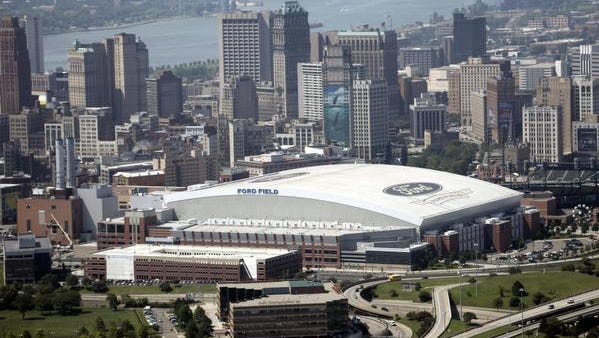Detroit officials redevelop plans for MLS at Ford Field bid

Detroit — The bidders hoping to bring Major League Soccer to Ford Field say they can produce a soccer experience like the best venues in the league, and even in the major European leagues.
MLS remains interested.
It is actively pursuing the best possible use of the indoor NFL stadium for soccer, according to the bidders and the league.
As the expansion process continues, with the top professional soccer league in North America looking for two additional cities, Detroit remains in the mix. The disappointment of Nashville and Cincinnati receiving MLS franchises over the past year is apparently little discouragement.
“I think MLS has now accepted the fact that Ford Field is the right place,” said Arn Tellem, vice chairman of the Pistons, who has been charged by owner Tom Gores with coordinating the bid in Detroit.
“We’re continuing our discussions with them.
“They view Detroit favorably and our application favorably, and we’re just going to continue to answer some of the questions that they have.”
“It’s been ongoing, the process.”
Dan Gilbert, the chairman of the Cleveland Cavaliers and founder of Quicken Loans, and the owner of the Detroit Lions, Martha Firestone Ford, are partners with Gores in the effort.
The clear preference for MLS is soccer-specific stadiums, to the point that it waited several months for Cincinnati to clear considerable site acquisition issues for its new stadium, while the proposal for Ford Field lay fallow.

But Tellem said there will not be any effort by the bidders, now or in the future, to develop a soccer-specific stadium in Detroit.
“Ford Field is and will continue to be the only place that we will consider playing soccer as part of MLS,” he said.
“I think the MLS state-position has been, at least in the first round of expansion, was that they have preferred soccer-specific stadiums. And I think there are two different perspectives here.
“Their perspective is that model works, and I guess where we have a different view on this,” Tellem said.
“We believe the most successful teams, Atlanta and Seattle, are playing in multi-purpose stadiums,” Tellem said. “They’re playing in football stadiums.”
Atlanta United FC (48,200) and the Seattle Sounders (43,666) led MLS in attendance last season.
Both Mercedes-Benz Stadium in Atlanta and CenturyLink Field in Seattle are outdoors, and architects were specifically charged with designing a dual-purpose stadium in Atlanta for soccer and North American football.
But Tellem also argues “location, location, location …
“And, there is no better location for a stadium in MLS than Ford Field,” he said.
“The most successful franchise are the ones that are situated in the core, the heart of the city. And the teams that have struggled are the ones in the ’burbs.
“It’s not so much about the size of a stadium or the purpose of a stadium, it’s about location; it’s really what is the most determining factor,” Tellem said.
Indeed, MLS officials have stressed the desirability of venues in an urban core — almost as much as they have stressed soccer-specific stadiums.
When MLS Commissioner Don Garber announced in May that Cincinnati would finally receive what had been intended as one of two expansion franchises awarded in 2017, he said passing over Detroit would give the bidders a chance to reconsider how they would feature soccer.
“We’re working with that ownership group on possible modifications of Ford Field that could, perhaps, make that city more MLS ready than it is today,” Garber said, the night MLS fans in Cincinnati celebrated, according to Cincinnati.com.
“What is going on now is MLS is taking deeper dive into Ford Field and doing an analysis. It is going to come back with some recommendations at some points as to what they feel needs to be done to make it perfect for soccer,” Tellem said.
“And then, we’ll evaluate what their recommendations are.
“I think we can have a soccer experience there that rivals not only any MLS stadium but any European soccer experience, which is the thing that we’re trying to do.”
“We want to duplicate what the fans would feel if they are going to a game, whether it’s in Liverpool, or in Manchester, or in Berlin, or in Madrid, or Barcelona. We want to have that similar type of experience for our fans.”
MLS has announced no new timetable for awarding the next two expansion franchises, which had been planned for the end of 2018.
But one of the 2017 awards came five months into 2018, even as the league continued to work on the bid in Miami, for four years.
Sacramento, Phoenix, San Diego, Las Vegas and San Antonio are the prime competitors at this juncture. All propose developing soccer-specific stadiums.
But each must surmount either ownership or siting issues.
That said, they are likely to have plenty of time.
As MLS has shown in Cincinnati, Miami and with some other franchises, it is willing to be patient.
“It’s an ongoing dialogue that we’re having, and we don’t have all of the analysis done, yet,” Tellem said of retrofitting Ford Field for soccer.
“MLS has had some teams of people come out and spend time here looking at it, and we’re going to have a deep dive here over the next few months.
“The only way that we’re going to be involved is if it’s at Ford Field.”
gregg.krupa@detroitnews.com
twitter.com/greggkrupa